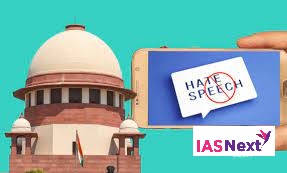CURRENT AFFAIRS
Get the most updated and recent current affair content on Padhaikaro.com
Plea on Hate Speech in Supreme Court
- IAS NEXT, Lucknow
- 14, Jan 2022

Context:
On January 12, 2022 , the Supreme Court of India agreed to hear petitions asking for legal action to be taken against the organisers of, and speakers at, the “Hardwar Dharma Sansad”.
What’s the issue?
During this Dharma Sansad, that had taken place between December 19 and 21, numerous speeches had been made.
- These speeches ranged from open calls to violence (“… waging a war that would be more gruesome than 1857” or “if you want to eliminate their [i.e., Muslim] population, then kill them”), to the economic and social boycott of Muslims (“… there is no Muslim buyer here, so throw that [Muslim] vendor out”), and to dog-whistles, (such as drawing comparisons to the ethnic cleansing of Rohingya Muslims in Myanmar).
Similar petitions in the Court:
Two petitions have been filed in the Supreme Court on hate speeches in the recent past.
- One petition asked the court to issue directions for action in such cases.
- The second plea sought special provisions, insisting that the IPC wasn’t enough to deal with hate speech and rumour mongering.
Both petitions relied on a 2020 Supreme Court decision in Amish Devgun case where hate speech was linked to the violation of unity and fraternity and breach of human dignity, which constitutes an essential facet of the right to life and liberty under Article 21 of the Constitution.
What’s the issue?
The petitioners were concerned over concerted events in the recent past that targeted political, social and economic exclusion of Muslims through a series of rallies and hate speeches.
- The petitioners sought implementation of guidelines on hate speech passed by Supreme Court in 2014 and on mob violence and lynching events in a subsequent decision in 2018.
What is Hate Speech?
Hate speech is an incitement to hatred against a particular group of persons marginalized by their religious belief, sexual orientation, gender, and so on.
- The Law Commission, in its 267th report on hate speech, said such utterances have the potential to provoke individuals and society to commit acts of terrorism, genocide, and ethnic cleansing.
How is it treated in Indian law?
Sections 153A and 505 of the Indian Penal Code are generally taken to be the main penal provisions that deal with inflammatory speeches and expressions that seek to punish ‘hate speech’.
Why Hate Speech Must be curbed?
- Internal Security: The Muzaffarnagar riots of 2013 was triggered by a fake video that incited communal passions.
- Igniting extremist sentiments.
- Mob lynching.
- Misinformation and disinformation: Delhi Riots.
Measures:
- The world’s biggest social media companies, including Facebook, Google, Twitter and ByteDance, are exploring an industry-wide alliance to curb fake news on their platforms in India.
- The Election Commission of India must tie up with tech companies to identify the creator of such news.
- Educating the end-users.
- The government should bring out a policy framework on the possible harm due to the internet messaging platforms to engage at a deeper level.
- Imposing hefty fines, like in Germany the Social media companies face fines of up to €50m if they persistently fail to remove illegal content from their sites.
Need of the hour:
- Hate speech is a discursive process of pushing marginalised groups outside of social, economic and political spheres of society by disseminating hate propaganda and encouraging discrimination. At its most harmful, it is widely recognized as a precursor to ethnic cleansing.
- Public authorities must be held accountable for dereliction of the duty of care and also for non-compliance with this court’s orders by not taking action to prevent vigilante groups from inciting communal disharmony and spreading hate against citizens of the country and taking the laws into their own hands.